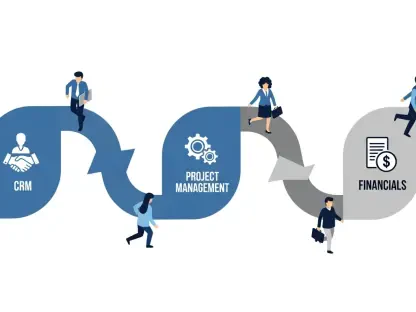Imagine a world where complex workflows across industries are managed not by teams of specialists, but by autonomous agents tailored to specific tasks, tirelessly executing operations with precision and adaptability. This is no longer a distant vision but a reality being shaped by cutting-edge tools like the Claude Agent SDK, developed by Anthropic. As automation continues to redefine productivity in the tech landscape, this SDK stands out as a transformative platform for developers aiming to build intelligent agents capable of handling intricate processes. This review delves into the capabilities, trends, and real-world impact of this technology, offering a comprehensive look at its role in shaping the future of AI-driven solutions.
Core Features of Claude Agent SDK
Agent-Building Framework
At the heart of the Claude Agent SDK lies a structured approach to agent creation, revolving around a foundational loop of gathering context, executing actions, and verifying outcomes. This systematic process ensures that agents are not just reactive but proactive in understanding the environment they operate within. Developers can leverage this framework to design agents that adapt to dynamic conditions, making it a cornerstone of effective automation.
A key aspect of this framework is the use of advanced techniques like Agentic Search, which enables efficient data retrieval from diverse file systems. Additionally, Semantic Search provides quicker results by focusing on concepts and vector embeddings, though it sacrifices some precision for speed. These tools empower developers to build agents that can swiftly access and process relevant information.
The iterative nature of testing and evaluation further refines agent performance. By continuously assessing search effectiveness, rule integration, and the creativity of tool usage, the SDK facilitates ongoing improvement. This emphasis on refinement ensures that agents evolve to meet increasingly complex demands with reliability and accuracy.
Custom Tools and Seamless Integrations
The SDK offers robust support for custom tools, enabling developers to craft functionalities like task management operations, exemplified by functions such as “fetchInbox.” These tools allow agents to handle specific tasks with precision, whether managing data or automating repetitive processes. Moreover, the capability for code generation supports the development of sophisticated operations tailored to unique requirements.
A standout feature is the Model Context Protocol (MCP), which streamlines API integrations to enhance agent functionality. This protocol ensures that external systems can communicate effectively with agents, expanding their operational scope. Such seamless connectivity is vital for creating agents that operate within broader ecosystems without friction.
These custom tools and integrations significantly boost the adaptability and efficiency of agents. By allowing tailored solutions and smooth interoperability, the SDK ensures that agents can be deployed across varied contexts, meeting the specific needs of different industries with ease.
Verification and Reliability Systems
Ensuring reliability is a critical focus of the Claude Agent SDK, achieved through a meticulous verification process. Defined rules provide a clear benchmark for agent performance, while visual feedback, such as screenshots for UI tasks, offers tangible evidence of task completion. These mechanisms help identify discrepancies early in the process.
Language model evaluations add another layer of scrutiny, assessing outputs against established standards. This multifaceted approach to verification minimizes errors and enhances trust in agent performance. Consistency across applications is maintained, which is essential for industries relying on dependable automation.
By addressing potential errors through these systems, the SDK builds confidence in its technology. The focus on reliability not only improves user experience but also positions the platform as a dependable choice for developers tackling high-stakes workflows.
Emerging Trends in Agent Development
The Claude Agent SDK aligns with the broader movement toward automation and autonomy in technology. This trend reflects a growing demand for systems that can independently manage tasks, reducing human intervention while maintaining high standards of accuracy. The SDK plays a pivotal role in accelerating this shift by providing tools that simplify the creation of self-sufficient agents.
Capabilities such as file management and command execution stand out as defining features of this platform. These functionalities enable agents to handle intricate operations, from organizing data to executing precise instructions. Additionally, adaptive learning through iterative processes ensures that agents improve over time, aligning with evolving user needs.
These developments are reshaping developer expectations and industry benchmarks for autonomous solutions. The ability to create agents that learn and adapt sets a new standard for what automation can achieve, pushing organizations to rethink traditional workflows and embrace more innovative approaches.
Real-World Applications of Claude Agent SDK
Across various sectors, the Claude Agent SDK demonstrates remarkable versatility through specialized agents tailored to unique challenges. Finance Agents, for instance, assist with investment evaluations and portfolio management, providing data-driven insights that enhance decision-making. Similarly, Personal Assistant Agents streamline scheduling and context tracking, boosting individual productivity.
In customer service, Customer Support Agents manage user interactions with efficiency, resolving queries and improving satisfaction rates. Meanwhile, Deep Research Agents excel in data analysis, sifting through vast datasets to uncover actionable patterns. These diverse applications highlight the SDK’s capacity to address niche requirements across domains.
The impact of these implementations is evident in the enhanced productivity and innovation they bring to their respective fields. By automating complex tasks, the SDK frees up human resources for strategic roles, fostering creativity and driving progress in ways previously unattainable.
Challenges and Limitations
Despite its strengths, the Claude Agent SDK faces certain challenges that could hinder its broader adoption. Technical complexities in agent design pose a steep learning curve for developers unfamiliar with advanced AI frameworks. Additionally, scalability issues may arise when deploying agents for large-scale operations, requiring significant infrastructure support.
Integration with existing systems can also present hurdles, as compatibility issues may disrupt seamless implementation. Regulatory constraints and market dynamics further complicate widespread use, particularly in industries with stringent compliance requirements. These obstacles underscore the need for tailored solutions to address specific deployment scenarios.
Ongoing efforts by Anthropic aim to mitigate these limitations, focusing on improving accessibility and simplifying integration processes. As development progresses, addressing these challenges will be crucial to ensuring the SDK reaches its full potential across diverse user bases and applications.
Future Outlook for Claude Agent SDK
Looking ahead, the Claude Agent SDK holds immense promise for further advancements in automation capabilities. Potential enhancements could include more intuitive design interfaces and expanded integration options, making it easier for developers to build and deploy agents. Such improvements would solidify its position as a leader in the field.
The long-term impact on industries reliant on autonomous agents is expected to be profound, particularly in sectors like finance, healthcare, and logistics. As workflows become increasingly AI-driven, the SDK could serve as a catalyst for redefining operational efficiency, setting new benchmarks for productivity over the coming years, starting from 2025 onward.
Emerging breakthroughs in AI technology may further elevate the SDK’s role in the market. Innovations in machine learning and natural language processing could enhance agent intelligence, enabling even more complex task execution. This trajectory suggests a future where the SDK becomes an indispensable tool for automation.
Final Thoughts and Assessment
Reflecting on this evaluation, it is clear that the Claude Agent SDK has carved a significant niche in the realm of autonomous agent technology. Its structured approach to agent creation, coupled with a robust feature set, has positioned it as a standout platform for developers seeking to innovate.
Moving forward, stakeholders should consider exploring the SDK’s migration guide to leverage its latest capabilities and stay ahead of the curve. Addressing the identified challenges through community collaboration and continued development by Anthropic will be essential. As industries evolve, adopting such tools could prove pivotal in maintaining a competitive edge in an increasingly automated landscape.









